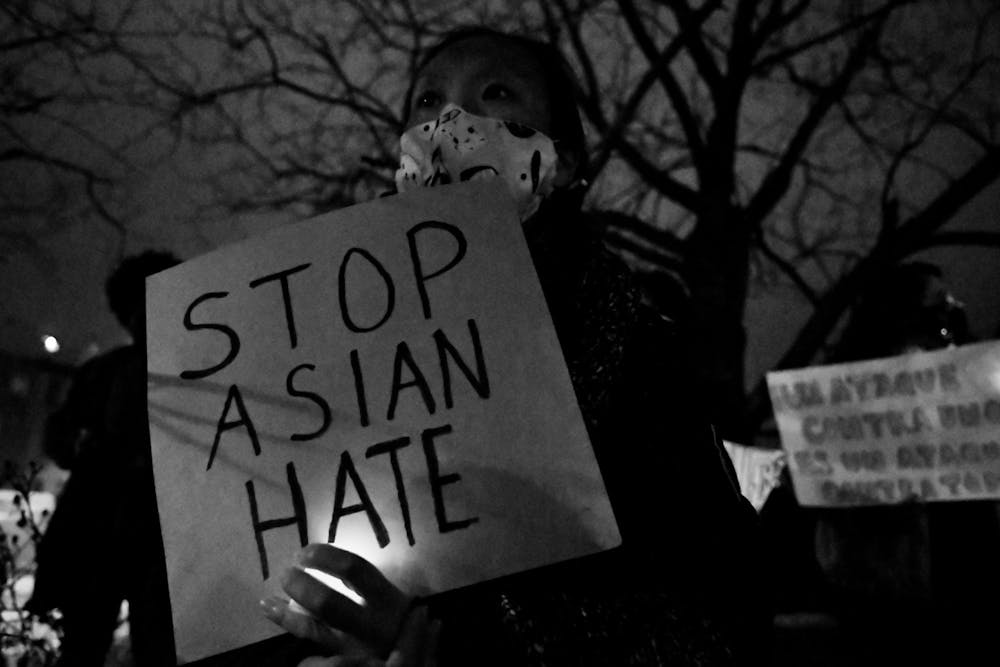
The COVID-19 Hate Crimes Act, signed by President Biden on May 20, is intended to expedite Justice Department reviews of hate crimes against the AAPI community and to aid local law enforcement in processing bias-driven incidents.
Credit: Sukhmani KaurOn May 20, President Biden signed into effect the “COVID-19 Hate Crimes Act” after its near-unanimous passing in both the House and Senate. The new anti-Asian hate crime law is intended to expedite Justice Department reviews of hate crimes related to COVID-19 — many of which are perpetrated against Asian American and Pacific Islanders (AAPI) — and provide federal grants for local law enforcement agencies to better investigate, identify, and report bias-driven incidents.
Amid the clatter of politicians applauding Congress’ recent “hard work” towards dismantling “hatred and ... bias” in America, a louder sound can be heard: one that exposes the misleading American dream of exceptionalism and racial equality. On one hand, the passage of the new act seemingly elevates AAPI visibility and marks a celebratory step towards racial progress in America — politicians heard the woes of AAPI individuals, saw the heightened violence enacted against Asian Americans during the pandemic, and came to the rescue wielding the power of policy-making. Yet, this one-track narrative is misleading.
In reality, the passage of the law is like smoke and mirrors; it falsely reassures constituents that Congress has addressed the violence targeted towards AAPI persons when its actions remain, at best, a PR band-aid solution, ineffective at addressing the deeper wounds of systemic racism against AAPI communities in America. Notably, the bill alienates AAPI individuals from Black and brown allies by increasing reliance on law enforcement, agencies of which have been responsible for entrenching violent and systemic racism against these communities.
Racial oppression of AAPI individuals has existed from the very start of our nation’s history, when America proved to be not quite the land of the free but the land of white privilege — promises of equality, independence, and freedom being for white Americans alone. From the first influx of Asian immigrants up until now, AAPI individuals have been perpetually viewed as “oriental,” “foreign,” and “exotic” in America.
Whether it’s through racially biased misrepresentations of “oriental” Asia in Western productions like Miss Saigon on Broadway in the '90s, the latest blockbuster films that unceasingly portray Asia through the lens of techno-orientalism (think Marvel movies showcasing Asian countries within the context of neon street lights, masked assassins, underground casinos, and exotic new technology), or the hypersexualization of Asian women for centuries which contributed to the deadly massacre in Georgia, it’s clear that “recent” anti-Asian hate and biases stem not from the pandemic alone but from a much deeper, historical practice of “othering” AAPI people.
Anti-Asian hate and racism is deeply rooted in the West’s history of imperialism in Asia. It is sustained by the model minority myth being spoon-fed to AAPI members and weaponized against Black and brown individuals to divide minoritized communities. It is maintained by the invisibility of AAPI individuals in mass media, entertainment, and public policy discussions. “There’s such a deeply entrenched history of violence against Asians that a simple bill is not the solution,” noted Angela Ji, a rising College junior. “We need to address the root causes, such as white supremacy, patriarchy, and the long legacy of imperialism in Asia, if we want to combat this ongoing violence.”
The COVID-19 Hate Crime Act facilitates the review process of hate crimes, but it fails to dismantle structural conditions that subject minoritized communities to prejudice and violence in the first place. It expands public campaigns to raise awareness of hate crimes, yet how successful can this be when AAPI members themselves are practically invisible in the national narrative, whether in politics or entertainment? It increases reliance on law enforcement to protect AAPI members, but it fails to consider how law enforcement itself is an integral gear that keeps systemic racism churning in America, further alienating AAPI individuals from Black and brown allies and their related works, like calls to defund the police.
Anti-Asian hate in America has always existed; the pandemic merely did the dirty work of exposing it to the mainstream. Dismantling such ingrained norms of AAPI-targeted racism requires more than the mere passage of this one law on COVID-19-related anti-Asian violence.
Other more powerful and effective solutions exist, and these are the solutions we should be advocating for. As Jason Wu, co-chair of GAPIMNY-Empowering Queer & Trans Asian Pacific Islanders told NBC News, rather than increasing federal grants for law enforcement, funds could instead be divested into community-based alternatives and solutions, like improving mental health care infrastructure or neighborhood trauma centers.
Importantly, addressing anti-Asian hate must come from systemic, granular change. It comes from participating in restorative justice practices, from increased education and awareness of how to combat racism in America, and from persistent activism and advocacy beyond social media posts and Instagram stories. Congress’ new Asian hate crime act is far from achieving the racial progress America needs to be at when it comes to AAPI rights and visibility, and we can not fall falsely comfortable or complacent with what has “already been done” by our politicians.
LARK YAN is a College senior from Toledo, Ohio studying philosophy, politics, and economics. Her email is larkyan@sas.upenn.edu.
The Daily Pennsylvanian is an independent, student-run newspaper. Please consider making a donation to support the coverage that shapes the University. Your generosity ensures a future of strong journalism at Penn.
Donate




